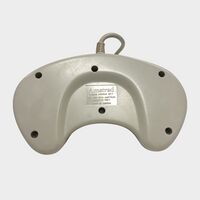Difference between revisions of "Mega PC"
From Sega Retro
Zilog Jones (talk | contribs) m (→Hardware: removed repetition) |
|||
| Line 77: | Line 77: | ||
|{{galleryPrintAd | |{{galleryPrintAd | ||
|sfm|1|27 | |sfm|1|27 | ||
| + | |mms|10|113 | ||
|cvg|141|81 | |cvg|141|81 | ||
|cvg|143|83 | |cvg|143|83 | ||
Revision as of 01:05, 15 September 2023

| ||||||||||||||||||||||||||||||
| Mega PC | ||||||||||||||||||||||||||||||
|---|---|---|---|---|---|---|---|---|---|---|---|---|---|---|---|---|---|---|---|---|---|---|---|---|---|---|---|---|---|---|
| Manufacturer: Amstrad | ||||||||||||||||||||||||||||||
|
The Amstrad Mega PC is a special Amstrad computer with the added features of a Sega Mega Drive. It was initially released in 1993 in PAL regions for the expensive price of £999.99 (later £599.99). It is unrelated to the Sega Teradrive, though the two machines share similar specifications as the computer portion is also powered by an Intel 386SX processor.
Though a rare collector's item now, at the time of release the machine was unsuccessful due to its high retail price (made worse by the fact in 1993 a 386 processor was considered outdated).
Contents
Hardware
The Mega PC can also play any Japanese and/or US-localized game as well as unlicensed games.
Althrough the video always originates from the 15-pin VGA connector, the video timings differ between Mega Drive mode and PC mode. The original monitor as a Multisync VGA monitor, which accepted 15 kHz video from the Mega Drive portion and the 31 kHz signal from the PC portion.
The hardware of the PC part is a design entirely based on a chipset from Western Digital Corporation (also known as WDC at the time). The ISA bus/memory controller, combined floppy/hard disk controller, multi-I/O controller and SVGA chipset produced by Western Digital.
Two ISA connectors from the ISA riser-card are 16-bit, although one is reserved for the Mega Drive itself, which uses an 8-bit connection. The only connection between the Mega Drive and the PC itself is the Yamaha FM sound chip that can be used as an AdLib-compatible sound card, including a 15-pin connector for a traditional analogue joystick or MIDI interface. Whether or not the Mega Drive can make use of this connector is unknown. One can change the IRQ of the card between IRQ2/3/5, though an AdLib card normally doesn't make use of it. Original AdLib cards and clones always use a fixed IRQ and port address.
The SVGA graphics memory can be upgraded to 512 KB by using two additional 1 Mbit chips (most likely two chips of the 414256/411000 variety with 20 pins). Despite the silkscreen on the motherboard, 41464 chips are not very useful, since the total amount of video memory would be 320 KB.
The board also has holes for a feature connector of the graphics card to allow the SVGA graphics to pass-through to cards like MPEG accelerators or TV tuner cards. The header pins would be needed to be soldered in to enable this "feature".
The onboard memory consisted of four 30-pin SIMM sockets, expandable up to 16 MB of RAM. There are prepared connectors on the motherboard to allow up to 8 MB of total RAM with 1 MB modules.
Beside these obvious features, there are other leftovers that didn't made it into the final unit:
- PC-type joystick port on the motherboard, right to the serial ports. The entire hardware is missing and the case is not designed for this.
- Onboard PC speaker. The speaker was replaced with a larger one, with a volume control on the back.
- Front panel connector for things like reset switches, etc.
It seems as though Amstrad simply bought the design from Western Digital, and added a Mega Drive in the form of an 8-bit ISA card.
A later revision, named the Amstrad Mega PC Plus, used an 80486 processor and had a RAM upgrade.
Specifications
- Processor: Intel or AMD 80386SX @ 25 MHz, Motorola 68000 @ 7.14 MHz
- Memory: 1 MB SIMM RAM (expandable to 16 MB)
- Storage: 3.5" FDD, 40 MB HDD
- Video: Western Digital WD90C11A-LR SVGA graphics with 256 KB RAM (upgradeable to 512 KB) + VDP of the Mega Drive passed through with a ribbon cable.
- Operating System: MS-DOS 5.0 with Amstrad Desktop
- Dimensions: 325 mm(w) x 78 mm(h) x 292 mm(d)
- Power Usage: ~50W
- Connectors: (Mega Drive): Cartridge, two game controller ports, headphone jack, expansion connector for a planned Mega CD upgrade
- Connectors: (PC): IEC power cord connector with pass-through for a monitor, PS/2 connectors for keyboard and mouse, DB25 parallel port, two RS-232 serial ports, DB15 VGA connector
Photo Gallery
Magazine articles
- Main article: Mega PC/Magazine articles
Promotional material
also published in:
- Mean Machines Sega (UK) #10: "August 1993" (1993-06-30)[1]
- Computer & Video Games (UK) #141: "August 1993" (1993-07-15)[2]
- Computer & Video Games (UK) #143: "October 1993" (1993-09-15)[3]
Physical scans
| Sega Retro Average | |||||||||
|---|---|---|---|---|---|---|---|---|---|
|
| 60 | |
|---|---|
| Based on 1 review | |
References






